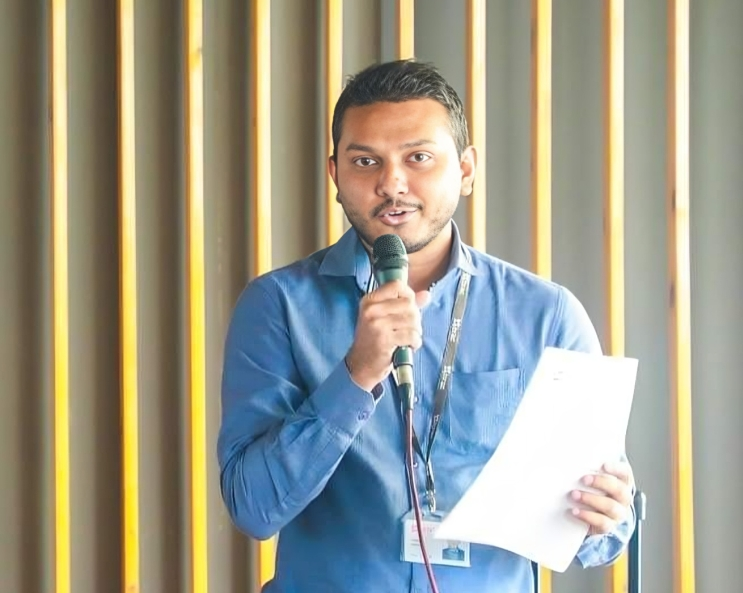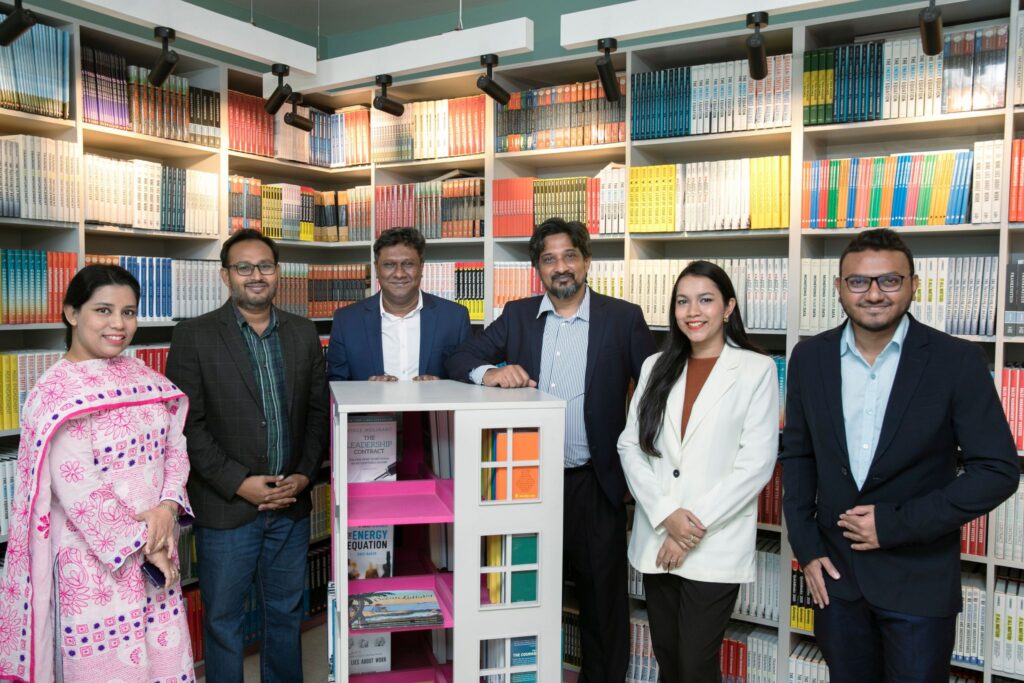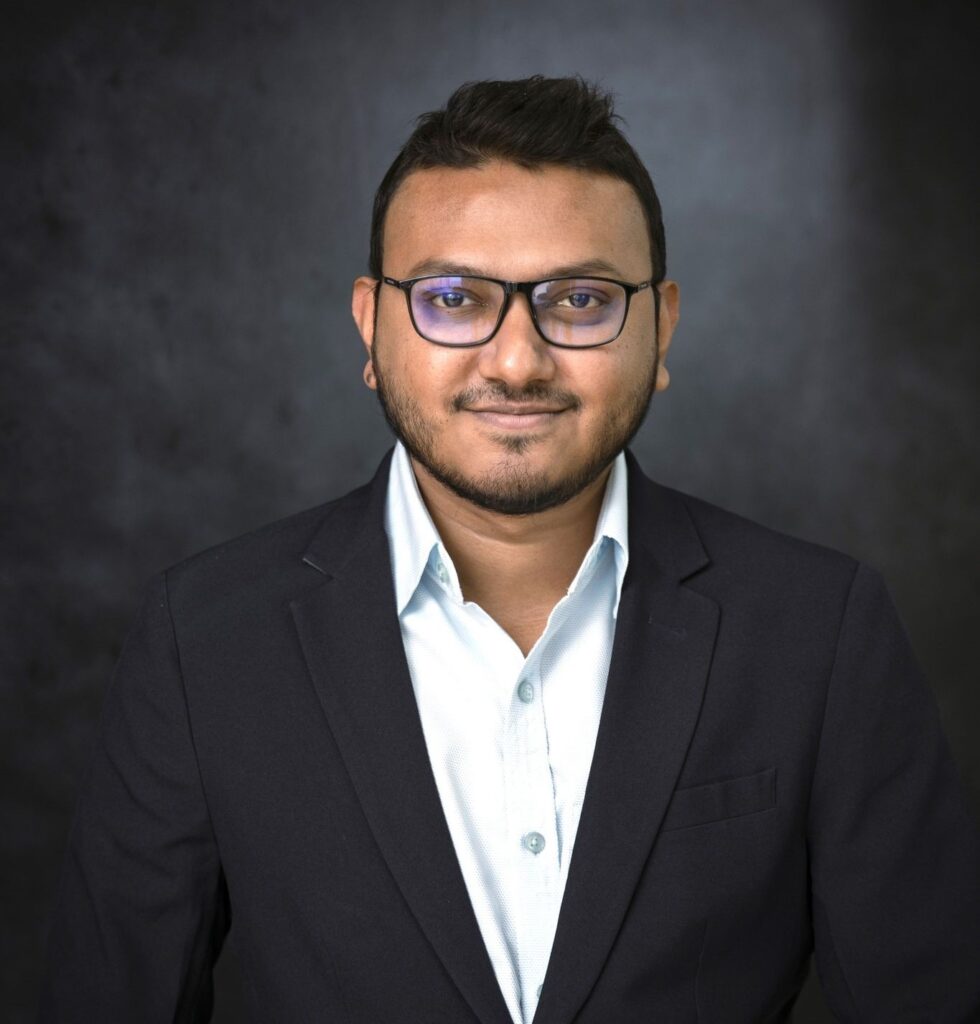Fardeen Rahman
Communications Coordinator
The Asia Foundation
Meet Fardeen Rahman, a dynamic Communications Coordinator at The Asia Foundation, with a passion for strategic outreach and impactful messaging. With a keen eye for detail and a knack for building connections, Fardeen excels in crafting compelling narratives that resonate globally. Discover how his innovative approach is shaping the future of corporate communications.
Let’s learn about his journey.

Mr. Fardeen Rahman, please share your professional and academic peregrination with our readers!
My career journey commenced in 2018 with a humble beginning, marked by a lack of clarity regarding the industries or even the sectors I would eventually find myself fit. However, it was within the development sector that I discovered a profound sense of purpose. Over the past six years, I have immersed myself in various roles, including communications coordinator, strategic communicator, and business development and partnership expert across multiple programmes. My experience extends to serving as a communications specialist, as well as a project and programme coordinator alongside a team player under the HR, Admin, and Legal unit for both national and international NGOs.
I have had the privilege of contributing to initiatives under esteemed entities such as the British High Commission (FCDO), several ministries under the Bangladesh Government, UN organizations, and corporate entities. Within these roles, I have undertaken the coordination of core and programme-related activities while also spearheading the planning, design, and delivery of diverse materials as a communications and content specialist. My commitment remains steadfastly directed towards leveraging my skills and expertise for the betterment of underprivileged communities, making meaningful contributions to their advancement.
As Communications Coordinator at The Asia Foundation, how do you ensure that your organization’s messaging is effectively disseminated to diverse stakeholders across different regions and cultural contexts?
In my role as the Communications Coordinator aimed at bolstering the Promoting Effective, Responsive, and Inclusive Governance in Bangladesh (PERI) Programme at The Asia Foundation, ensuring that our organization’s messaging is effectively disseminated to diverse stakeholders across different regions and cultural contexts is a paramount priority. To achieve this, I implement a multifaceted approach that encompasses several key strategies.
Firstly, I conduct thorough research and analysis to gain insights into the unique characteristics and preferences of our target audiences in various components of the programme. This enables me to tailor our messaging and communication materials to resonate with their specific needs, interests, and intervention sensitivities.
Additionally, I prioritize collaboration and consultation with the internal programme teams and external partners to gather diverse perspectives and inputs. By engaging stakeholders, regardless in the form of strategic partners, donors or coalition members from different aspects and combinations, we ensure that the messaging is relevance and effective across diverse contexts.
Furthermore, I leverage a mix of traditional and digital communication channels to reach our target audiences effectively within the range of permitted accessibility. This includes depicting local responsiveness, presenting culturally appropriate imagery, and an effective storytelling techniques to enhance engagement and understanding.
Can you share a recent communications campaign or initiative you spearheaded at The Asia Foundation that successfully raised awareness about a pressing social or economic issue in the Asia-Pacific region?
The Asia Foundation is currently engaged in a nationwide initiative aimed at generating knowledge to raise awareness about Strengthening the Grievance Management Committee (GMC). This term refers to an effective mechanism designed for conflict resolution and the implementation of compensatory measures in response to challenges encountered during the recruitment, documentation, and processing phases of migrant workers from Bangladesh. The GMC serves as a pivotal resolution unit at both the aspirant migrant workers and the sub-agent levels, facilitating access to justice for migrant workers in national context and beyond. At a grassroots level, GMCs convene to address select cases within local village courts.
To effectively convey the significance of the GMC mechanism, the initiative involves the production of video documentation for widespread dissemination. This visual representation not only highlights the GMC as a programmatic facet of the PERI initiative but also underscores its role as a continuation of collaborative efforts among nationwide stakeholders and catalysts involved in the labor migration process. The storytelling aspect of the documentation will feature a dramatization based on a real-life migration-related complaint, showcasing the interactions between the plaintiff, defendant, and the GMC unit. Moreover, it will portray the evolution of this mechanism, from ideation to strategy design and implementation.

As a young professional in the nonprofit sector, what strategies do you employ to stay agile and adaptive in an ever-changing landscape of global development challenges?
The nonprofit sector is mostly characterized by a continuous process of learning and adaptation. Navigating its complex landscape demands not only a robust intellect but also a creative mindset. Patience and keen observation are essential virtues here; as expected progress or success seldom occurs overnight. Agility is paramount; one must remain poised to anticipate and swiftly respond to unforeseen challenges with calculated measures or contingency plans.
Assuming ownership of assigned tasks is imperative, whether individually or as part of a collaborative team effort. Proactivity is key to anticipating and shaping the future trajectory of initiatives, especially in times of impending change. Maintaining a forward-looking perspective and cultivating a vision that extends beyond immediate horizons are essential for sustained growth and success in this dynamic environment.
How do you leverage digital media and technology to amplify The Asia Foundation’s communication reach and engage with new audiences, especially among younger demographics?
Operating within the dynamic and intricate sphere of government leadership, ministries, individuals, and civil society organizations, The Asia Foundation recognizes the paramount importance of leveraging digital media and cutting-edge tools for targeted message dissemination. Establishing and nurturing strong relationships with media stakeholders, including influencers, opinion leaders, and professional personnel, is fundamental to our strategy.
Effectively engaging with our audience entails crafting content that resonates and capitalizing on emerging trends to capture the attention of our younger demographic. Our commitment extends beyond mere content creation; we aim to stay attuned to evolving preferences and swiftly adapt our approaches to seize opportunities as they arise. In a landscape where novelty is embraced, our agility lies in embracing experimentation and delivering innovative experiences that cater to the preferences of our audience.
Looking ahead, what do you see as the biggest challenges and opportunities for nonprofit organizations like The Asia Foundation, and how do you envision yourself contributing to its continued success as a future corporate leader in the sector?
In the future context, I see The Asia Foundation faces a significant challenge in navigating the delicate balance between political volatility and ensuring the effective survival of the masses in Bangladesh. As the political landscape continues to evolve, maintaining stability while addressing the diverse needs of the population presents a formidable task. However, amidst these challenges lies a notable opportunity—the abundance of young minds brimming with innovative ideas. Harnessing the potential of these visionary individuals to contribute to enhancing governance aspects in Bangladesh could be a game-changer. By fostering collaboration and empowering these young change-makers, The Asia Foundation can leverage their fresh perspectives and energy to drive meaningful progress and resilience in the face of political uncertainty.
Mr. Fardeen Rahman, please say something to the readers!
My professional journey of more than six years has been very emotional and full of surprises. Against all odds what kept me going was to strive for Godspeed on the horizon. My humble message to my audience will be to —
- Just hang in there on your own journey, even if you are alone, and wait for your turn,
- Always trust your instincts, your skills, and mostly in your maker who will make everything alright at some point,
- Always choose the hard way, the destination of a long journey from it is much more reliable and enjoyable rather than the ones made with casualty and technicality,
- Finally, don’t distract yourself with all the negativity we have around us today, the world might seem a bit funny, but try to put the joke away. Rest assured.

Quick Chat with Fardeen Rahman
The most outstanding achievement of your life as of now:
Contributing to the lives of 54 rural women entrepreneurs in the UNCDF-based Promoting Digital Financial Services for Women Micro Merchants in Rural Bangladesh project in Sirajganj and Sherpur to see each of their homes becoming a retail shop
The greatest philosopher in your view:
Shah Rukh Khan, who once said —
“Don’t become a philosopher before you are rich.”
Your Icon:
Jack Ma, former head of the Alibaba Group.
Name the most influential books you have read:
Killing Marketing: How Innovative Businesses are Turning Marketing Cost into Profit.
Your greatest fear:
The unnecessary efforts of one just to humiliate another.
Best piece of advice you’ve received:
Do your best first, then leave everything to your maker’s hand.
You in only three words:
Observant, kind, industrious.
Skill Set
● Hard Skills
- Logistic Management
- Writing
- Communications Management
- Presentation
- Coordination and Leadership
- Documentation
- Graphic Designing
- Creative Direction
● Soft Skills
- Punctuality,
- Cooperation,
- Patience,
- Precision etc.
Prayer For Human Civilization:
Let love take charge, let love decide the future course of mankind.
The InCAP: Thank you, Mr. Fardeen Rahman! It’s a glittering conversation with you!
Mr. Fardeen Rahman: My pleasure! Wish you all the best! Thank you.
To read more about Professional’s stories, Please Click Here!







